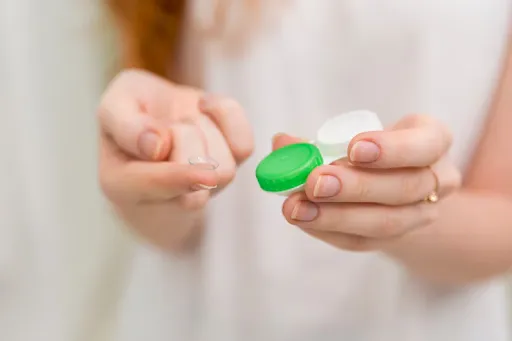Allergy Impact
Managing Contact Lens Comfort During Allergy Season
FSDAVCFEBFEVSDDVFSD
FSDAVCFEBFEVSDDVFSD
FSDAVCFEBFEVSDDVFSD
How Allergies Affect Contact Lenses
Allergy season can bring extra challenges for contact lens wearers. Pollen, dust, and dander can get trapped between the lens and your eye, leading to dryness, redness, itchiness, and blurred vision. Seasonal eye allergies can make this irritation worse, causing your lenses to feel even more uncomfortable, especially if you already have sensitive eyes or conditions like dry eye syndrome.
Additionally, allergies increase the risk of eye infections. Rubbing itchy eyes transfers allergens and bacteria to your lenses, which can cause irritation or infection. Understanding how seasonal eye allergies affect your eyes is crucial for maintaining comfort and protecting your vision during allergy season. Proper lens care and precautions can help alleviate discomfort and reduce the risk of complications.
Allergy season can bring extra challenges for contact lens wearers. Pollen, dust, and dander can get trapped between the lens and your eye, leading to dryness, redness, itchiness, and blurred vision. Seasonal eye allergies can make this irritation worse, causing your lenses to feel even more uncomfortable, especially if you already have sensitive eyes or conditions like dry eye syndrome.

Additionally, allergies increase the risk of eye infections. Rubbing itchy eyes transfers allergens and bacteria to your lenses, which can cause irritation or infection. Understanding how
seasonal eye allergies affect your eyes is crucial for maintaining comfort and protecting your vision during allergy season. Proper lens care and precautions can help alleviate discomfort and reduce the risk of complications.

Tips for Comfort During Allergy Season
Managing contact lens discomfort during allergy season requires a few practical strategies to improve comfort and reduce irritation. One effective solution is switching to daily disposable lenses. With fresh lenses every day, you minimize the build-up of allergens, dust, and other irritants that can cause discomfort and blurred vision. Daily disposables can significantly improve comfort by ensuring that no allergens remain on the lenses, offering a cleaner, more comfortable experience throughout the day.
Another helpful approach is using rewetting drops designed specifically for contact lenses. These drops help to keep your eyes moist, alleviate dryness, and remove any allergens or debris that might have accumulated on the surface of the lenses. Using rewetting drops can help prevent the irritation that occurs when allergens get trapped between the lens and the eye, improving overall comfort.
Finally, it’s important to maintain good lens hygiene and cleaning practices. Regularly cleaning and disinfecting your lenses will ensure that any allergens and particles are removed, further reducing discomfort. These simple steps can help you manage your contact lenses effectively during allergy season, providing clearer vision and improved comfort.
Switch to Daily Disposable Lenses

One of the most effective solutions for managing contact lens discomfort during allergy season is switching to daily disposable lenses. Since these lenses are discarded at the end of each day, you avoid reusing lenses that may have collected allergens like pollen, dust, and dander. This minimizes the risk of irritation, discomfort, and potential eye infections caused by trapped allergens
In addition to reducing allergens, daily disposable lenses are more hygienic and convenient. You won’t have to worry about cleaning or storing lenses overnight, as you can simply put on a fresh pair every day.

This helps prevent bacterial buildup, ensuring that your lenses remain clean and your eyes stay comfortable. With no extra cleaning or maintenance required, daily disposables offer a practical solution for allergy sufferers looking to maintain both eye health and ease of use during allergy season.
For individuals with severe allergies, switching to daily disposable contact lenses can provide significant relief. These lenses are designed to be worn for a single day and then discarded, meaning you avoid the buildup of allergens such as pollen, dust, and pet dander that can accumulate on reusable lenses. This helps to minimize irritation, dryness, and discomfort that can occur when allergens are trapped on the lens surface.
By wearing a fresh pair of lenses every day, you can reduce the chances of developing allergic reactions and ensure better eye health. This daily routine can also improve comfort throughout the day, as it eliminates the need for cleaning and maintenance of reusable lenses. Additionally, daily disposables offer a more hygienic option for those with sensitive eyes or pre-existing conditions like dry eye syndrome, allowing allergy sufferers to maintain clear vision and comfort with minimal hassle.
Maintain Good Lens Hygiene
Proper hygiene is crucial when wearing contact lenses, especially during allergy season when allergens can easily accumulate on the lenses. Cleaning and disinfecting your lenses regularly is essential to ensure they stay free of particles like pollen, dust, and dander. Use a cleaning solution that is specifically designed for your type of lens to remove these irritants and prevent any discomfort. Always follow the manufacturer’s instructions for cleaning and handling your lenses to maintain their effectiveness and your eye health.
It’s also important to avoid using tap water to rinse your lenses, as it can introduce harmful bacteria and microorganisms that may lead to eye infections. Tap water, even if it appears clean, contains substances that can damage your lenses and put your eyes at risk. Instead, always use a recommended lens solution for cleaning and storing your contacts. By following these hygiene practices, you can help protect your eyes and enjoy clear, comfortable vision during allergy season.
Consider Specialty Contact Lenses
If you continue to experience irritation during allergy season despite following general care tips, specialty contact lenses may offer relief. These lenses are designed for individuals with sensitive eyes or conditions like dry eye syndrome, offering enhanced comfort and protection.
Scleral lenses, for example, are larger, rigid lenses that cover the entire cornea, creating a protective barrier. This design prevents allergens and irritants from coming into direct contact with your eyes, reducing discomfort and dryness.

If you continue to experience irritation during allergy season despite following general care tips, specialty contact lenses may offer relief. These lenses are designed for individuals with sensitive eyes or conditions like dry eye syndrome, offering enhanced comfort and protection.
Scleral lenses, for example, are larger, rigid lenses that cover the entire cornea, creating a protective barrier. This design prevents allergens and irritants from coming into direct contact with your eyes, reducing discomfort and dryness.
By providing a shield for the eyes, scleral lenses help maintain moisture and reduce the symptoms of irritation caused by allergens. If you struggle with seasonal allergies and traditional lenses aren’t providing enough comfort, discussing specialty lenses with your optometrist may be a good next step for optimal eye health and comfort.
By providing a shield for the eyes, scleral lenses help maintain moisture and reduce the symptoms of irritation caused by allergens. If you struggle with seasonal allergies and traditional lenses aren’t providing enough comfort, discussing specialty lenses with your optometrist may be a good next step for optimal eye health and comfort.
Consult Your Eye Doctor
If your allergies continue to affect your contact lens comfort, it’s important to consult with your optometrist. Persistent irritation can be a sign that your current lenses or eye care routine aren’t providing the necessary relief, especially during allergy season. Your optometrist can evaluate your eye health and recommend solutions tailored to your specific needs, ensuring that you can continue wearing contact lenses without discomfort.
One common recommendation is to switch to daily disposable lenses. These lenses are discarded at the end of each day, reducing the risk of allergens building up and causing irritation. With daily disposables, you benefit from a fresh pair of lenses each day, minimizing the likelihood of allergens affecting your eyes and ensuring cleaner lenses with less maintenance required.
For individuals with more severe allergies or underlying conditions like dry eye syndrome, specialty contact lenses may be more effective. Scleral lenses, for instance, are larger, rigid lenses that cover the cornea and create a barrier to keep allergens from coming into contact with your eyes. These lenses offer significant comfort and protection for people with sensitive eyes or chronic dryness, especially during allergy season.
Your optometrist will guide you through various options to manage your allergies while ensuring optimal comfort and vision. From adjusting your lens type to enhancing your cleaning routine or recommending specialized lenses, professional advice can help you maintain healthy, comfortable eyes despite the challenges posed by allergy season. Regular consultations and personalized care will keep you comfortable and reduce allergy-related irritation.
The Role of Regular Eye Exams

Regular eye exams are essential for managing allergies and maintaining eye health. Your optometrist can assess the condition of your eyes, checking for signs of irritation, dryness, or infections caused by allergens. These exams help identify any issues early, allowing for timely intervention and treatment.
If your allergy symptoms persist, your optometrist may recommend adjustments to your contact lens type or prescription. For example, switching to daily disposables or specialty lenses, like scleral lenses, may provide added comfort and protection from allergens. Personalized recommendations ensure that your contact lenses continue to meet your needs while minimizing discomfort.
Regular eye exams are essential for managing allergies and maintaining eye health. Your optometrist can assess the condition of your eyes, checking for signs of irritation, dryness, or infections caused by allergens. These exams help identify any issues early, allowing for timely intervention and treatment.
If your allergy symptoms persist, your optometrist may recommend adjustments to your contact lens type or prescription. For example, switching to daily disposables or specialty lenses, like scleral lenses, may provide added comfort and protection from allergens. Personalized recommendations ensure that your contact lenses continue to meet your needs while minimizing discomfort.
In addition to adjusting your lenses, your eye care professional may suggest modifications to your overall eye care routine. This might include using lubricating drops, cleaning solutions, or other products that can help reduce irritation and maintain eye health throughout allergy season. Regular exams keep you on track for optimal eye comfort and vision.
In addition to adjusting your lenses, your eye care professional may suggest modifications to your overall eye care routine. This might include using lubricating drops, cleaning solutions, or other products that can help reduce irritation and maintain eye health throughout allergy season. Regular exams keep you on track for optimal eye comfort and vision.
Protect Your Vision During Allergy Season
Maintaining comfort and clarity during allergy season is possible with the right care. Switching to daily disposable lenses can help minimize allergen buildup, reducing irritation and preventing infections. Using rewetting drops designed for contact lenses can provide additional comfort by soothing dryness and flushing out allergens that may collect on the lens surface. Ensuring proper hygiene by regularly cleaning and disinfecting your lenses also plays a crucial role in minimizing discomfort.
If allergy symptoms persist, consulting with your eye doctor is essential. They can assess your situation and recommend the best solutions, whether it's a different lens type or adjustments to your eye care routine. If you need expert guidance, contact Kleinwood Vision for personalized care. With the right approach, you can continue to wear contact lenses comfortably and maintain clear vision throughout allergy season. Your eye doctor can provide personalized advice to ensure your eyes stay healthy and irritation-free.

Contact Info
Hours of Operation
Mon - Fri | 9:00 AM - 5:00 PM
Sat - Sun | Closed
Holiday Hours: We are closed for the following holidays: New Years Day, Memorial Day, Independence Day, Labor Day, Thanksgiving Day, Christmas Day
© 2026 Kleinwood Vision. All rights Reserved.


